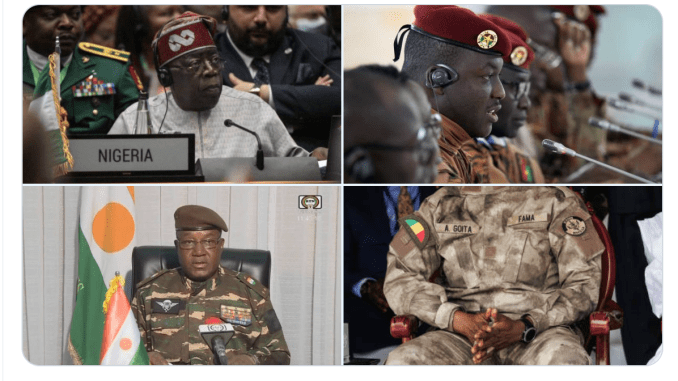
By Obinna Ejianya (9News Nigeria – Melbourne, Australia)
The recent decision by Burkina Faso, Mali, and Niger to withdraw from the Economic Community of West African States (ECOWAS) is a worrisome development with significant implications for regional cooperation, security, and stability. This move has raised concerns about the future of regional cooperation, security, and stability.
In this article, we will critically examine the reasons behind this withdrawal, the potential implications, and the urgent need for diplomatic efforts to address these challenges.
Captain Ibrahim Traoré of Burkina Faso, Colonel Assimi Goita of Mali, and Brigadier Gen. Abdourahamane Tiani of Niger say ECOWAS which is currently under the leadership of the Nigerian President Bola Ahmed Tinubu has “adopted an irrational and unacceptable posture by imposing illegal, illegitimate, inhumane and irresponsible sanctions in violation of its own texts.”
The three states say ECOWAS has moved away from “the ideals of its founding fathers and spirit of Pan-Africanism” and the bloc has been captured under the “influence of foreign powers, betraying its founding principles” and has become a “threat to its member states and its populations whose happiness it is supposed to ensure,” Colonel Amadou Abdramane, Niger junta spokesman, said in the statement.
In a joint statement released on Sunday, the military-led governments of Burkina Faso, Mali, and Niger expressed their decision to immediately withdraw from ECOWAS. The leaders cited the bloc’s departure from its founding principles and its failure to support member states in their fight against terrorism and insecurity as the main reasons for their withdrawal. They accused ECOWAS of being influenced by foreign powers, betraying its original vision and becoming a threat to its own member states and populations.
The formation of the Alliance of Sahel States and the alignment with external powers further complicates the situation. It is imperative for diplomatic efforts to be intensified to address the grievances and concerns of all parties involved. Only through collective action and unity can the sub-Saharan region overcome these challenges and pave the way for a peaceful and prosperous future.
ECOWAS’ Response and the Uncertain Future
ECOWAS, in its response to the withdrawal announcement, stated that it had not received any formal notification from the three countries regarding their intent to leave the bloc. The regional body emphasized its commitment to finding a negotiated solution to the political impasse and reiterated the importance of Burkina Faso, Mali, and Niger as key members of the community.
However, the withdrawal of these three nations raises significant questions about the future of ECOWAS. The bloc, established in 1975 to promote economic integration and cooperation among member states, has faced numerous challenges in recent years, including rampant coups and political instability. The suspension of Burkina Faso, Mali, and Niger following their respective military takeovers, as well as the imposition of heavy sanctions, further strained the relationship between these countries and ECOWAS.
The Alliance of Sahel States and the Role of External Powers
In response to their shared grievances with ECOWAS, Burkina Faso, Mali, and Niger have formed an “Alliance of Sahel States” to address their security concerns and combat jihadist violence. This alliance marks a significant shift in their foreign policy, as they have severed military ties with France, their former colonial power, and sought assistance from Russia and Russian mercenaries.
The withdrawal from ECOWAS and the alignment with external powers have raised concerns about the potential spread of instability and violence across the Sahel region. The French military’s withdrawal from these countries, combined with economic sanctions, has created a volatile environment that could potentially affect the stability of neighboring coastal countries, such as Ghana, Togo, Benin, and Ivory Coast.
The Humanitarian and Security Consequences
The Sahel region has been plagued by extremist attacks, with a sharp increase in violence and conflict-related fatalities in recent years. The withdrawal of Burkina Faso, Mali, and Niger from ECOWAS could further exacerbate these challenges, leaving the countries more vulnerable to terrorist groups and hindering regional efforts to combat insecurity.
Furthermore, the economic implications of the withdrawal cannot be overlooked. ECOWAS membership has facilitated the free movement of goods and people within the region, contributing to economic growth and development. The withdrawal could disrupt trade and make goods more expensive, while also potentially leading to the re-imposition of visa requirements for travel.
The Need for Diplomatic Efforts and Unity
Given the gravity of the situation, it is crucial for regional and international actors to engage in high-level diplomacy and dialogue to address the concerns raised by Burkina Faso, Mali, and Niger. The restoration of peace, stability, and unity within the sub-Saharan region requires a collective effort to find common ground and resolve the underlying issues.
Nigeria, as a prominent member of ECOWAS and a key regional power, plays a vital role in mediating and facilitating a peaceful resolution. President Tinubu’s administration should employ diplomatic strategies to prevent further escalation of economic and security instability in the sub-Saharan region.
Some Nigerian leaders of thoughts have shown concern, sharing anxieties on the possible dastard implication of the three countries’ unified pullout from the ECOWAS.
Femi Fani Kayode wrote on his x (formerly Twitter) account: “The withdrawal of Mali, Burkina Faso and Mali from ECOWAS is a sad and unfortunate development. The fact that they have formed a hostile confederation right on our northern border is also troubling and has grave implications for our security. May God restore the brotherhood and unity we once enjoyed in our sub-region and may He preserve the peace.”
In conclusion, the recent decision by Burkina Faso, Mali, and Niger to withdraw from ECOWAS is a worrisome development with significant implications for regional cooperation, security, and stability. The leaders of these countries have expressed their concerns about ECOWAS’s departure from its founding principles and its failure to support member states in their fight against terrorism and insecurity.
The formation of the Alliance of Sahel States and the alignment with external powers further complicates the situation, raising questions about the future of ECOWAS. The withdrawal could have humanitarian, security, and economic consequences, exacerbating instability and hindering regional efforts to combat insecurity. Therefore, it is crucial for diplomatic efforts and unity to be prioritized in order to address the concerns and grievances of all parties involved and restore peace, stability, and unity within the sub-Saharan region.
By Obinna Ejianya (9News Nigeria – Melbourne, Australia)

